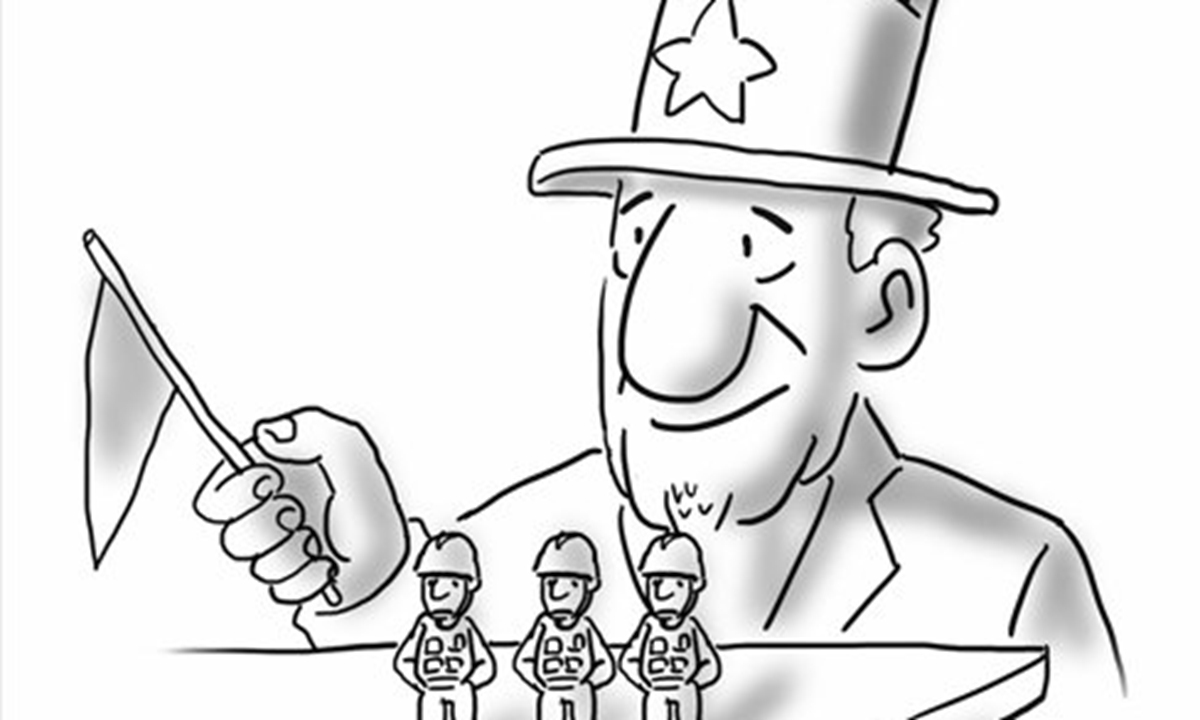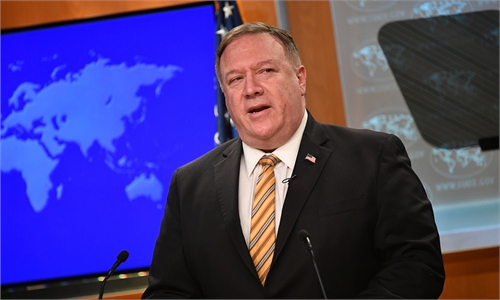
Illustration: Liu Rui/GT
A latest survey of the Center for Strategic and International Studies (CSIS) showed that US thought leaders are prepared to take considerable risk to defend US allies and partners against military threats from China.Admittedly, an alliance is formed in the face of common threats for countries involved. Any country facing a security threat will want allies to help. However, this kind of alliance is not a united front. The US demands that its allies be united with it in every aspect. Alliance means giving up certain individual interests to meet collective security needs. However, with regards to science and technology, economy, and other areas, both Europe and Asia have an inextricable partnership with China that they cannot afford to give up. For example, according to South Korean media reports, a South Korean diplomat revealed that in the fifth South Korea-US strategic economic dialogue held on October 14, Seoul rejected Washington's pressure to ban Huawei from its 5G network construction.
What's more, China has been Japan's largest trading partner since 2007. All suggest that the cost of sacrificing their own economic interests is too high for these so-called allies of the US. Moreover, they do not feel threatened by China in terms of their security. It is therefore not necessary for Japan and South Korea to give up their existing interests for a non-existent threat to satisfy US ambitions. This is also the challenge for Washington as it tries to build an alliance system.
The gap in military power between China and the US is narrowing compared with a decade ago. And US' lack of leadership continues to undermine confidence in its military might with many of its old allies. Under Trump's presidency, with the massive withdrawal of US troops from Germany, the US has become less protective and attentive to its allies. Besides, although the US has been declaring its shift to the Indo-Pacific region, its indifference to the multilateral system, shown by its scaled back presence at the East Asia Summit and ASEAN gatherings, has made it less credible in the surrounding region.
A year ago, a survey by the Chicago Council on Global Affairs found that only 38 percent of the US public was in favor of sending troops to help defend the island of Taiwan if the Chinese mainland seeks reunification by force. But in the latest CSIS survey, Americans are prepared to take considerable risks to defend allies and partners. And on a scale of 1-10 where "10" means worth taking significant risks, Taiwan has scored almost as high as other US allies.
The result has been greatly influenced by what the Trump administration is doing. Foreign media's propaganda on the Taiwan question has always been biased and distorted. It falsely portrays Taiwan as being squeezed and threatened by the Chinese mainland. Such large-scale misleading propaganda has guided public opinion. The policy adjustment of the Trump administration has had impacts on people's understanding of the Taiwan question. As the US is trying to boost ties with Taiwan by selling weapons and sending senior officials there, these moves have made people believe that the Trump administration is recalibrating US policies toward Taiwan.
The poll, based on a fact-free sampling of propaganda, is meaningless. And perceptions that are shaped by the US government are not representative of the whole population.
Many countries in Asia may have wishful thinking about US' ability to defend them as an ally. However, Asian thought leaders' confidence in the US commitment to their defense is still below the high level of risk that certain American leaders said they were willing to take in defense of allies and partners, according to the poll.
That is to say, US' commitment to its allies is premised, and it reflects the perception gap between US and its allies.
Military conflict in the Indo-Pacific region that would require US involvement is unlikely. Even if it did happen, the US would not act rashly. It is more likely that Washington will want to act as a protector and send warnings in the early stages of a conflict. It will want to dissuade its allies from escalating tensions. Turning tense times into a military conflict is a long way off. The US does not want to get involved in a regional military conflict again after its failures in the Middle East over the past two decades. Whether it is more important to pursue the "America First" or restore US leadership, Washington is now urgently working to solve its domestic problems. The public may not want the US to get involved in regional conflicts.
The author is a research fellow with the Institute of America Studies, China Institutes of Contemporary International Relations. opinion@globaltimes.com.cn


